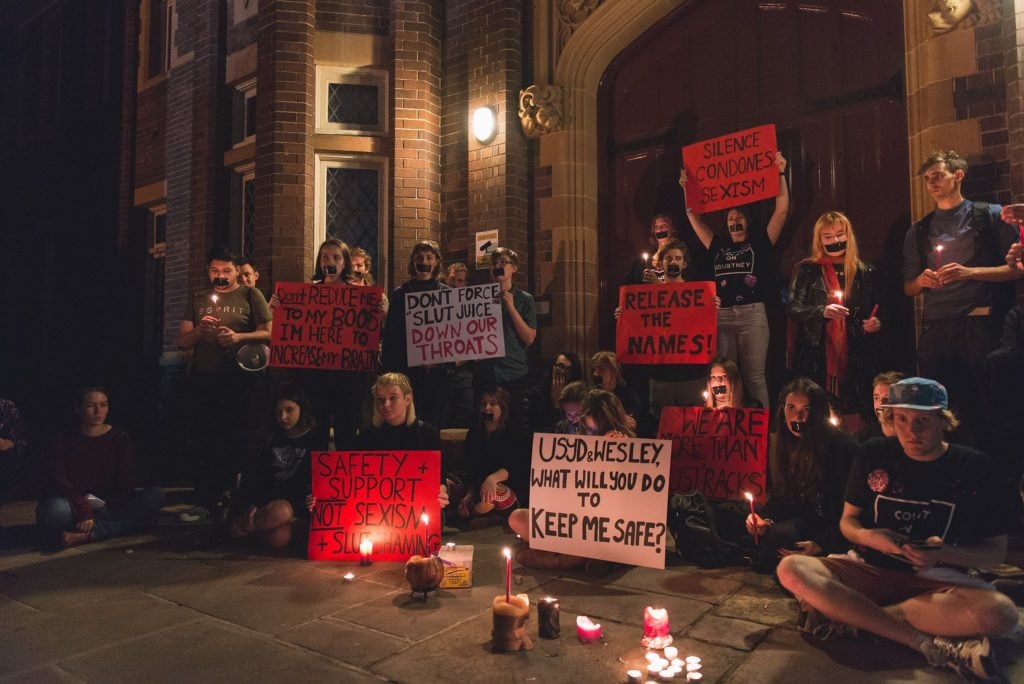It’s Time To Hold Wealthy, Elite University Colleges Accountable For Sexual Assault
$30,000 a year to be hazed and harassed? Something's broken.

This post discusses sexual assault.
—
Today, End Rape on Campus Australia released The Red Zone Report, a 200-page exposé of toxic college culture. The report, co-authored by myself and Walkley Award-winning journalist Nina Funnell, details a long history of misogynistic abuse at colleges around the country, along with the utter failure of college administrations to address cultures of violence and sexism within their communities.
While they shed a rare light on the internal workings of these secretive and insular institutions, these horrific stories also beg the question: how do we intervene in cultures with such deeply entrenched problems?
Given that sexual violence is, fundamentally, a matter of power, it’s no surprise that it’s so ubiquitous in these powerful institutions. The intertwined hierarchies of class, gender and race give college students an immense sense of entitlement — not only to the luxury lifestyle that college affords, but to the bodies of those further down the social hierarchy. The stories emerging in the recent tidal wave of #MeToo allegations show the extent to which such power not only enables sexual assault and harassment, but protects perpetrators and silences their victims.
To tackle these cultures of sexual violence, then, it’s critical to first understand the nature of the elite and wealthy classes to which college students belong. A room at St Paul’s College for a first-year student in 2018 will set them back $30,000 — roughly three times the price of a room in an average inner-west share house.
The University of Sydney colleges occupy almost half the land of the main campus, crowding out lecture theatres and libraries. Their residents live in ancient, heritage-listed sandstone buildings that literally look down upon the rest of the university. They have their rooms cleaned for them and their meals prepared by caterers — students at Women’s College are even treated to fine wines, hand-picked to complement their dinners.
This wealth is showcased and celebrated in ostentatious college events. For a formal at St Paul’s College in 2016, the entire college quadrangle was turned into an ice rink, and the students were served drinks with flecks of real gold. The ‘Great Occasions’ page of the St Paul’s website boasts: “there are always fireworks”.
The colleges are also deeply masculine spaces. The Red Zone tells stories of women being ranked by their physical attractiveness, being advertised as attractions at college parties, and experiencing seemingly endless incidents of brutal sexual assault. These are social spaces in which men occupy a default position of authority, and systematically abuse this power for their own personal gain.

Protestors at The University of Sydney’s Wesley College. Image supplied.
College students (in particular, college men) then graduate and move on to occupy positions of social power and influence in politics, law, the media, and the corporate sphere. And some return to their colleges to take up governance positions, consolidating this power in the elite network of ‘old boys’.
Six colleges at the University of Sydney are founded in acts of state legislation, dating back to the 1850s, that afford college councils significant autonomy over their own affairs. This leads to entrenched cultures that are remarkably difficult to shift. The self-perpetuating cycle of the old boy culture creates powerful institutions, shielded from scrutiny, willing to protect their reputations and their traditions at all costs.
Perhaps this is why colleges have, over many decades, comprehensively failed to address the high rates of sexual violence occurring within their walls. News articles about hazing, sexual assault and sexual harassment in colleges date back to 1930. Yet just last year, an inquiry conducted by former Sex Discrimination Commissioner Elizabeth Broderick found that one in 17 women had experienced attempted or actual sexual assault during their time at college, a rate six times higher than their male counterparts. 12 percent of these incidents happened during a single week of the year: Orientation Week.
In other words, college administrations have been aware of these problems for almost a century, yet very little has changed over this time. Their response, time and again, has been to batten down the hatches and to conduct “internal inquiries” rather than publicly admitting responsibility for the violence within their communities — mere damage control, instead of genuine commitment to change.
In light of this, it’s clear that what is needed is wholesale transformation of the college system. We need to review or even repeal the legislation that underpins the autonomy of the colleges. We also need a national taskforce to investigate the cultural problems at colleges, led by the Tertiary Education Quality and Standards Agency, sexual assault experts and student representatives.
Whether or not these reforms will be effective in eradicating sexual violence altogether from college communities will depend on the willingness of college communities to finally take responsibility for the cultures they have allowed to fester and the violence they have allowed to occur.
It’s high time that we ask ourselves whether colleges themselves, as archaic bastions of privilege and power, really have a place within a fair, equitable and safe higher education system in 2018.
—
Anna Hush is an Ambassador for End Rape on Campus Australia and co-authored the Red Zone Report. She was the Women’s Officer at the University of Sydney in 2016, where she coordinated a campaign against sexual assault on campus.
—
The Red Zone Report is the result of an extensive investigation into sexual assault, harassment and hazing at Australian residential colleges, conducted by advocacy group End Rape on Campus Australia. The report gives evidence of these practices dating back to 1930 at the University of Sydney colleges, and calls for significant changes to the college system.
The report will be available online in full from Wednesday.
–
Feature image via Jason Tong / Flickr


